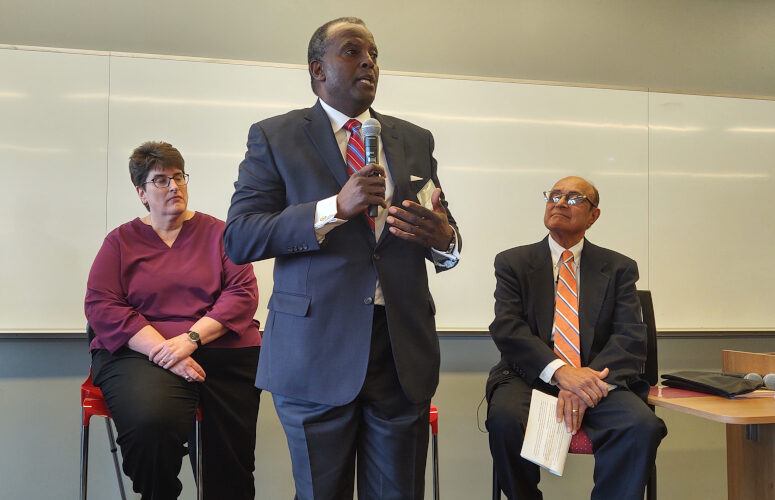
Supply Chain Leaders to Emerge from New Rutgers Program
By Anthony Birritteri, Editor-in-Chief On Apr 26, 2023Rutgers Business School yesterday officially launched the “Road to Supply Chain Leadership Program” (RSCL) in which the first cohort of 30 students will gain industry experience working with 10 sponsoring companies.
At a celebratory event at Rutgers University’s Piscataway campus, Sundar Raman, founding director of the RSCL, said that participating students – all sophomores and juniors – will be matched with a company based on their respective preferences. Students will have the opportunity to receive academic training, one-on-one mentoring, participate in experiential learning projects, attend conferences and obtain internships.
The program was developed in response to the many challenges that national and global supply chains experienced during the COVID-19 pandemic, in addition to the growth the industry is expected to encounter in the region.
“There was a need and opportunity that wasn’t being met in this area,” said Jeffrey Hermann, founding member of the RSCL program and president and CEO of Hermann Services, a 95-year-old national distribution services company based in South Brunswick. “During the pandemic, the supply chain experienced many shocks. Now more than ever, the industry needs creative, analytical, and well-rounded people to transform our supply chains so that they become more efficient, agile and environmentally sound for decades to come.”
Explaining that port business will double and even triple by 2050, Beth Rooney, port director for the Port Authority of New York & New Jersey, told business students, “You are going to be in charge of that cargo increase and be part of the transformation. … I think it’s exciting. The entire world will not function without what you all are going to be doing.”
The 10 businesses that are sponsoring and taking part in the program include Bayer Consumer Health, Bristol Myers Squibb, Colgate-Palmolive, Estee Lauder Companies, Hermann Services, Panasonic, Pfizer, Shiseido, and Unilever.
New Brunswick Mayor James Cahill, explaining the importance of programs such as the RSCL, said companies usually are too focused on the day-to-day operations of running their businesses. “That is when academia comes into play,” he said. Through academia and students, “you get people with fresh ideas … the research, the innovation … you get the best and brightest of students into your respective fields.”
Addressing the importance of diversity, equity and inclusion (DEI) in the industry, John E. Harmon Sr., founder, president, and CEO of the African American Chamber of Commerce of New Jersey, said DEI is “transformative.”
“Having the mosaic of different people from different perspectives and walks of life is valuable to the future. My hope is that you – young men and women – will step up into this space because you represent the value proposition of the future. Compete for these roles with vigor. Demonstrate that, at the end of the day, you are the answer to business solutions and challenges,” Harmon said.
Discussing the importance of leadership skills, Kris Kolluri, CEO of the Gateway Development Commission, the organization that is overseeing the $16 billion Gateway tunnel program, advised students to always be curious. More importantly, he advised students to learn the skill of decisiveness, as well as “having the guts” to admit one is wrong. He also said it is important to learn how to pivot to make sure one skillfully addresses changing circumstances.
Finally, he said, “You must also learn to accept diversity of views … cherish them, own them and use them because dogmatic responses to complex problems is a recipe for disaster.”
To access more business news, visit NJB News Now.
Related Articles:





